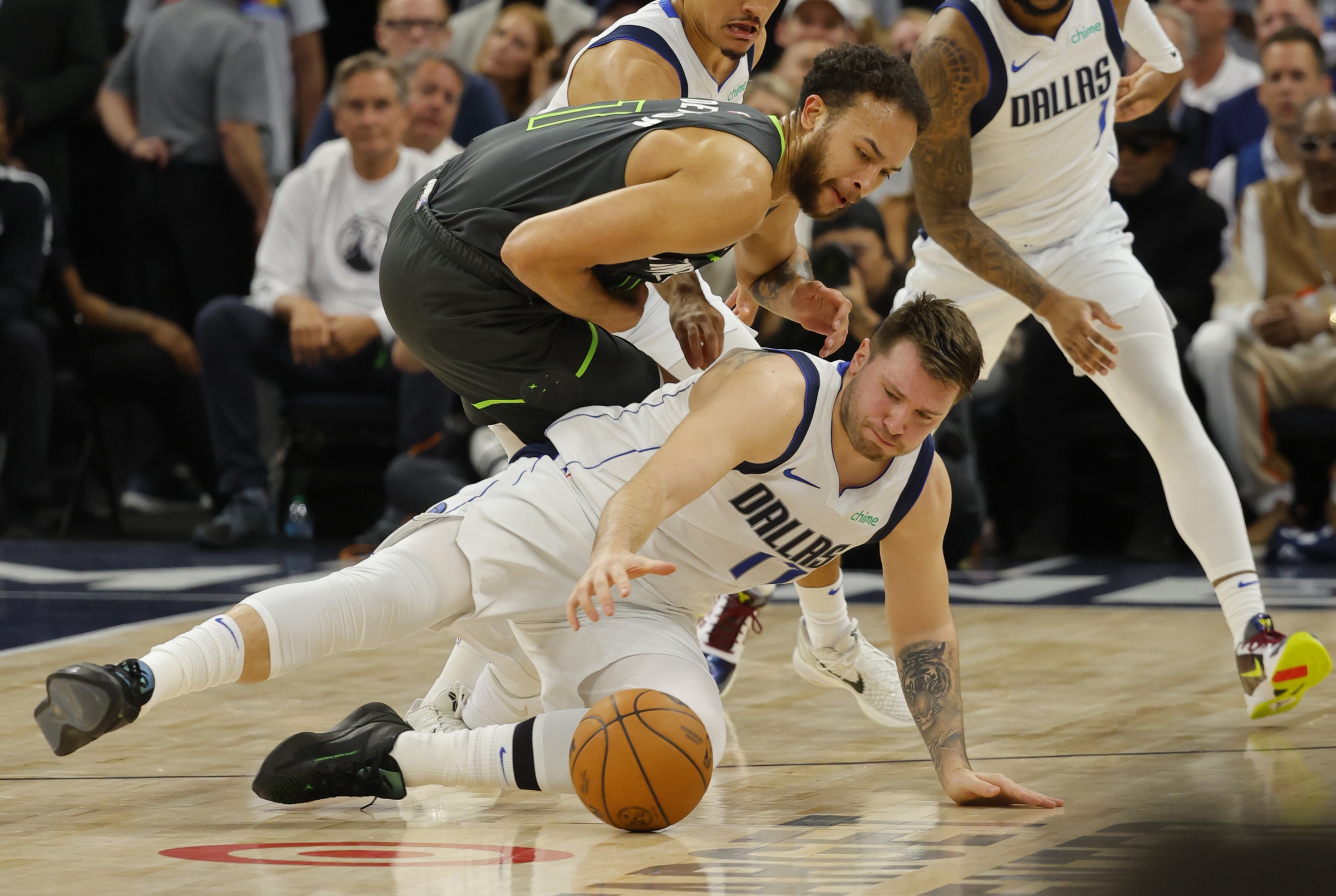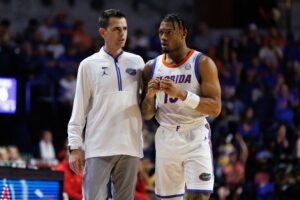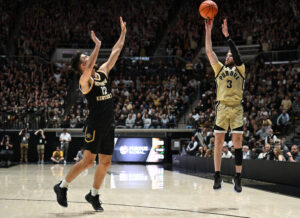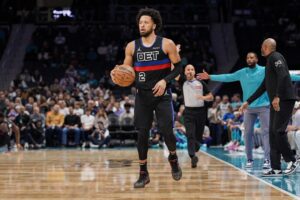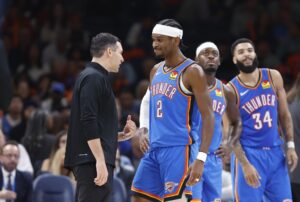The Golden State Warriors have not had the expected offseason, but they appear to be getting closer to owner Joe Lacob’s directive to get out of the luxury tax.
Golden State, coming off a disappointing campaign, lost Klay Thompson to the Dallas Mavericks and released Chris Paul. The Warriors, who had designs on making a run to the NBA Finals, won 46 games but missed the playoffs as they were ousted from the Western Conference Play-in Tournament by the Sacramento Kings. More significantly, the Warriors payroll was over $206 million in 2023-24, costing the Dubs a league-high $176.9 million — $34.5 million more than any other squad.
Golden State has tried to be shrewd in replacing Thompson and Paul. On July 1, the Warriors signed De’Anthony Melton to a one-year, $12.8 million contract. Melton was limited to 38 games due to injuries, but he put up solid all-around numbers.
Then yesterday, the Warriors acquired Kyle Anderson in a sign-and-trade deal with the Minnesota Timberwolves. The Warriors agreed to a three-year, $27 million contract for “Slow Mo,” but to make the deal work, the Dubs worked out a trade with the Timberwolves.
NBA Trade Grade: Dubs Steal “Slow-Mo” From Wolves, What Does Deal Mean For Both Squads?
The Warriors created a $16 million trade exception with the Thompson sign-and-trade with the Mavericks, and that is how they were able to slot in Anderson. The third year of Anderson’s deal (2026-27 season) is non-guarateed, according to The Athletic’s Anthony Slater.
ESPN’s Adrian Wojnarowski reported that Minnesota receives a future second-round pick swap and cash from the trade.
Golden State Warriors Trade Grade: A+
Anderson is a solid, versatile role player. The 30-year-old fits nicely into the Warriors culture and he and Melton immediately improve the Warriors’ defense. The Warriors allowed the 18th most points a season ago and were 15th in defensive efficiency.
Anderson figures to be the Warriors primary backup at power forward, behind Jonathan Kuminga, and should see time at small forward depending on what else the Warriors do.
While Anderson will do all the little things needed, the Warriors can’t expect scoring from the 6-9 forward. Other than setting picks, his primary offensive job will likely be as a secondary ball-handler. However, the Warriors also have Gary Payton II, Brandin Podziemski, and Melton to fill that role.
Anderson, who only has produced double-figures once in his career, averaged 6.4 points, 3.5 rebounds, and 4.2 assists with shooting splits of 46/22.9/70.8% this past season. He scored in double-figures on 16 occassions and produced double-digit rebounds and assists once.
Moreover, Anderson lands in Golden State on the cheap. Not only is his salary extremely manageable, but Anderson previously signed a two-year, $18 million deal with the Timberwolves, so he is technically taking a slight pay cut. Plus, all it cost the Warriors is a “bag of balls,” so to speak.
What Does The Trade Mean For The Warriors?
Following the moves, Golden State has 13 players on standard contracts with salaries totaling $167.7 million, or about $3.2 million below the luxury tax. Lacob has been aiming to get the Warriors out of the luxury tax this offseason. The Warriors are hard-capped at $178.1 million.
“We have expiring contracts this summer. We have a lot of flexibility as a result, and that was pretty important given the changes to the CBA,” Lacob told Tim Kawakami on Audacy’s “The TK Show” in February. “You really can’t have this kind of payroll in the future without being severely impacted in terms of the things you can do, as you know, and our fans know, the second apron. It’s all really true, and it does impact us. We’re already in really good position for that this summer. We’ll make decisions based on how we’re doing.”
“Our Plan 1A is actually we’d like to be out of the (luxury) tax, and we think we have a way to do that, Lacob continued. “That kind of is the plan, not just out of the second apron,” he said. “That’s important because the truth is we need to be out of the tax two years out of the next four in order to get this repeater (tax) thing off our books. We don’t want to be a repeater, it’s just so prohibitive. Not to say we wouldn’t do it if we had to, but you’ve got to look at what the downside is to doing that.”
What Is Next For The Warriors
However, the Warriors remaining out of the luxury tax this year doesn’t appear to be a mandate.
“I think it’s about being smart about it,” Warriors general manager Mike Dunleavy told reporters on June 24. “if there’s a point to go over the tax, if there’s a point to going into one of the aprons, we will do it, because the most important thing to him is winning. He’s shown that.”
Golden State is reportedly working on a sign-and-trade deal for Philadelphia 76ers wing Buddy Hield. Earlier this morning, Yahoo Sports Jake Fischer said that while no deal is in place, the Warriors and Sixers were tracking to make it happen.
There is no word on whether Golden State would send out a player or two in a trade for Hield. Payton and Kevon Looney, who are on expiring deals, have been floated as possibilities, as has Gui Santos.
If the Warriors don’t send out players in the trade for Hield, The Athletic’s John Hollinger suggested that sending Santos to Philadelphia and signing second-round pick Quinten Post to a rookie minimum deal would leave the Warriors $14 million under the tax apron for Hield. Here’s more from Hollinger:
“The only way I can see to import him at that salary is to incorporate Hield and Kyle Anderson into the same sign-and-trade that sent Klay Thompson outbound, turning it into a five-team mega trade between Charlotte, Dallas, Minnesota, Golden State and Philadelphia.”
According to Ky Carlin of Sixerswire, Philadelphia’s likely option is to not take any players in the trade but accept a couple of future second-round picks.
In addition to filling their 15-man roster, the Warriors must sign two more players on two-way deals. Pat Spencer is the only player on a two-way deal. Payton, Looney, and Stephen Curry are extension-eligible this summer. It would be a surprise if any of the trio received an extension.
Additionally, a decision on Podziemski’s 2025-26 club option is due on October 31.
Trade Grade For Minnesota Timberwolves: C
Minnesota had no choice but to allow Anderson to leave due to salary cap issues. The Timberwolves are a second-apron team with 12 players, including unsigned second-round picks Rob Dillingham and Terrence Shannon. As a result of their salary cap situation, the Timberwolves won’t be able to use the TPE generated by the Anderson sign-and-trade because of the restrictions for second-apron teams.
Minnesota, which lost Monte Morris in free agency, could use a veteran backup point guard and possibly a veteran wing. The Timberwolves also have to fill their three two-way spots.
Rudy Gobert and Josh Minot are extension-eligible this summer.


